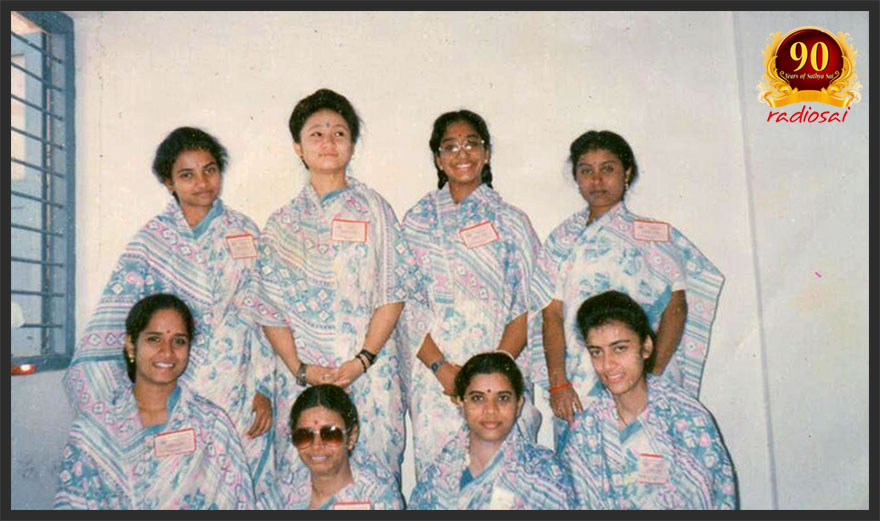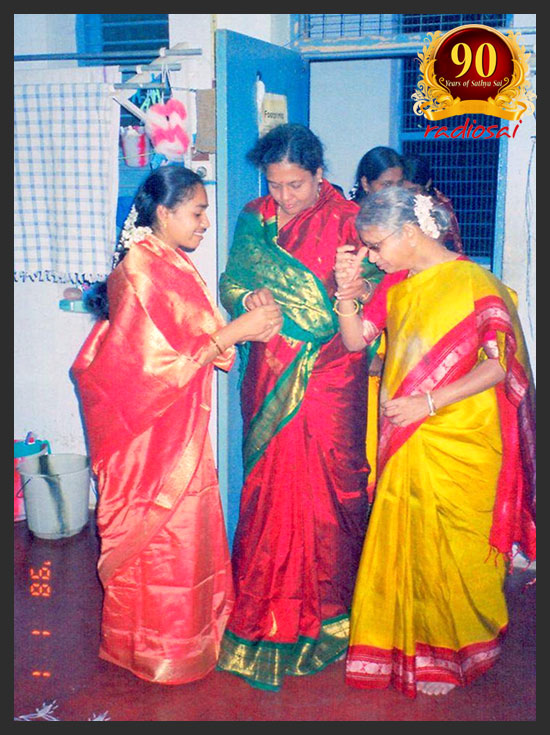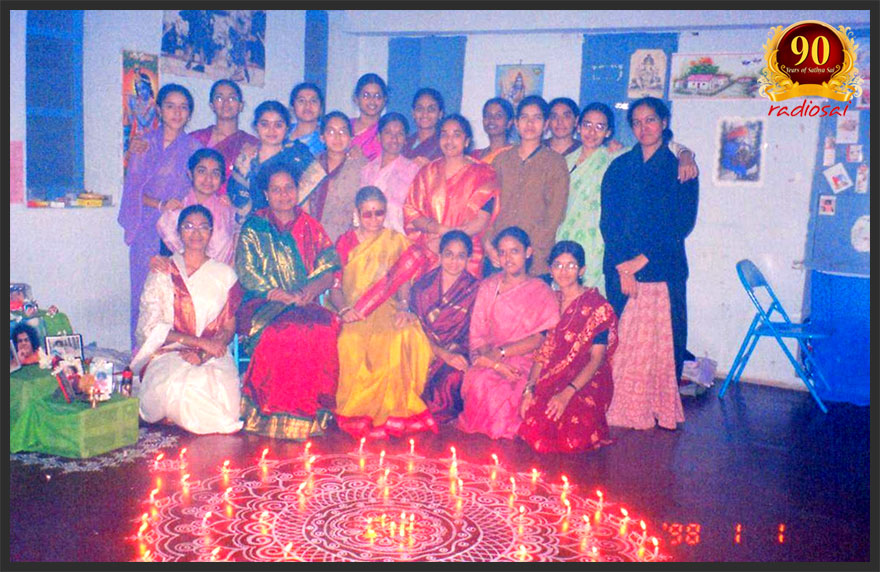|
|
| 'Like' us on Facebook | Follow us: |
Posted on: Mar 06, 2015
 |
Tamaso ma Jyotirgamaya
From Darkness Lead Me to Light
Part 01
Ms. S. Rama Devi personifies the journey of moving from external darkness to inner light. Her life is a story of extraordinary courage and unshakable faith that if you let the Lord guide your path, you do not necessarily need all five senses to make sense of life.
Ms. Rama Devi is an alumna of Bhagawan's Anantapur College, where she now serves as a resident tutor in the Sri Sathya Sai Women's Hostel. She was born in Bellary, Karnataka state in 1951. Though she was born visually impaired, her disability did not stop her from leading a nearly normal and independent life under the love and care of Swami.
Popularly known as Rama Akka (older sister) among her juniors, in 1972, she enrolled in the Bachelors programme in what was then known as the Sri Sathya Sai Arts and Science College for Women at Anantapur. With Bhagawan's encouragement and grace she earned a Master's degree in English from the nearby Sri Krishnadevaraya University in Anantapur.
Thanks to her proficiency in Braille, typing and her fondness for radio, Ms. Rama Devi is a well-informed, self-aware and independent person who has been tutoring batches of students at the Anantapur Hostel for decades now. She is the author of the book ‘Sai—My Radiant Guide’ which she offered at Bhagawan's Mahasamadhi on 14th January 2012.
The Women's Wing of the Employees Association of BSNL, a telecom company in India, came to know about Ms. Rama Devi's achievements and invited her in March 2010 for the celebration of International Women's Day as a gesture of appreciation for a visually challenged woman who stood her ground against many odds in life. They felicitated her with a citation and a memo.
As we approach International Women's Day on March 8, 2015, we share with you the experience of a real-life heroine who lives, walks and breathes the mantra ‘Tamaso Ma Jyotir Gamaya’ every moment of her life.
This is also the first article of our 90th Birthday special series 'The Master's Touch - Lessons of Life Directly at His Lotus Feet'. This is based on the lessons learnt by Sai Alumni studying and living at His lotus feet.
Karuna Munshi (KM): Sairam Sister Rama and welcome to Radio Sai.
Rama Devi (RD): Sairam Karuna and Sairam to all the listeners of Radio Sai.
Birth and Home Schooling
KM: The joy of your birth understandably was tempered with deep sadness for your family. How did they take it?
RD: There was so much sorrow in the family for some days but then all of them recovered. They thought “Let us accept the fact and take care of the child.” I grew up and started speaking and walking early. They were enjoying the way I grew up.
KM: Your other areas of development were very heightened and advanced, but what was it like to grow up with the visual impairment as a child?
RD: In the beginning I did not know I was visually impaired but slowly I came to know. People used to help me to walk, take me from place to place and would talk of colours which I did not know. All these things made me aware of the fact that I cannot see.
KM: Well, seeing your high level of awareness about yourself as well as the world around you, the question becomes – who were your early role models and influences? What conversations surrounded you while you were growing up?
RD: I grew up in a very loving family. Everybody took care of me and treated me as normally as they could. For a long time till the end of my childhood, I thought mother and father, sisters and brothers, grandparents, uncles, aunts and cousins all put together is a family. I did not know what a small family is.
 |
| Ms. Ramadevi (in dark glasses) on the last day of Summer Course 1990 in the Brindavan Ashram |
KM: It was this entire extended family that influenced you?
RD: Yes, particularly my grand uncle took a lot of interest in me from my infancy. He discovered when I was three or four years that I could grasp things very easily. He started teaching me all the shlokas and poems in Sanskrit and Telugu. He taught me the Mahabharata and Bhagavata by Potana. He used to read to me and explain all these epics. That is how my informal education began. I once asked him “Why do you tell stories in the night to the children? During daytime you read out to me all these poems and explain. Why don't you tell me also stories?” He said “No. You should study in the daytime and in the night I will tell you stories.” So it was like a school and I enjoyed learning. In the evenings he would discuss various episodes, especially in the Mahabharata which is a very big epic with very interesting episodes.
KM: Sounds like a very stimulating environment. Great learning happened there.
RD: Yes. He used to touch upon everything – history, geography, mathematics, and so on. He tried to teach me how to write numbers also.
KM: I see. What techniques did he employ to teach you?
RD: He used to make me touch everything and show how things are. I still remember once when we went for a walk he said “Rama, have you ever touched a police hat?” I said no. He called a policeman from the outpost near our house and said “I want this child to touch your hat.” The policeman bent down and I touched the hat, realizing that it is a little different from other hats. So he used to show me different things like that.
KM: Wonderful! You were very fortunate that you were exposed to so much of experiential learning. What about your formal education? After home schooling in the earlier years I understand you were moved to Chennai which is away from your home.
Blossoming in the Little Flower School
 |
|
| Celebrating Deepavali in the Anantapur Campus; Ms. Ramadevi is on far right |
RD: Yes. It was a turning point in my life and it was a new world. I did not know the languages English and Tamil.
KM: You only spoke Telugu which is your mother tongue. But when you went to the Little Flower School in Chennai the medium of instruction was English?
RD: Yes and the second language was Tamil. Everything was new and I felt lost in the beginning. But I learnt quickly and the teachers were also very helpful. There were some Telugu children and they entrusted me to a Telugu girl saying “You take care of her and teach her everything.”
KM: This was a school for visually impaired children. They must have used specific techniques to teach you because you are so good at typewriting and Braille reading.
RD: Yes, they taught me Braille. Reading and writing was done through the Braille system. For arithmetic and algebra they used a slate full of holes. It is a big rectangular slate in which we had to insert types one and half inches long. I was told to insert them according to the angles – straight angle or corner. You turn until eight and then for nine you turn the whole thing upside down and put it again. I learnt nine, zero, multiplication sign, division sign, minus sign, etc. like that. For ten we put one and then zero. Ten plus down seven becomes 17. Even for algebra we used some other types which indicate the letters a, b, c, x, y, and z.
KM: Growing up in your early childhood, did you have moments of self-doubt? Did you question “Why am I different from others?”
RD: Yes I did. I thought “Am I different or am I like other children?”
KM: Or maybe others are different? The way you have gone about your life Rama akka, you almost make it seem like you are the new normal!
RD: I did some very deep thinking and concluded that I am not different but I am normal. I thought nothing is wrong with me.
KM: Fantastic self-affirmation! During this time growing up you did have flashes of self-enquiry.
Inexplicable Deep Yearning for God
RD: Yes. My grandfather taught me devotional poems and so I had love for God and wanted to know God. I asked him one day “What is manasu or mind?” He tried to explain and said “Mind is something inside you. You cannot see or touch it, but you can feel it.” I slowly tried to understand these things.
KM: Now, let me quote a passage from your book ‘Sai–My Radiant Guide’. You said you could think of two instances which revealed in you a deep yearning for God. I am assuming this was at the Little Flower School in Chennai and I quote you: “In a moral science class, I asked my teacher ‘Doesn't God speak to anyone in the present times or perform miracles? Mother Mary appeared to Bernadette at Lourdes in France in the 19th Century and then to three children at Fatima in Portugal in 1970. But that was long ago.’”
What was your teacher’s reply?
RD: She said “Even today God speaks but He speaks to people who are receptive and people who have pure hearts. Miracles do take place nowadays. In 1939 in the midst of snow in Belgium Mother Mary's statue appeared and they built a church there.” Then I thought “That was only 25 years ago.”
KM: So you were satisfied.
RD: I thought that it was in the near present and so God may talk to some people. I felt at least I am in this era. But I never knew that I was going to come to God and all this is going to become a reality!
KM: Before we come to that chapter on the turning point where Sathya Sai Baba entered your life, after your elementary education at the Little Flower School, you went on to St. Raphael's Girls High School. It was an integrated programme because you were studying with sighted children. Was it hard to adjust?
RD: Not very hard. The children there used to help me and the teachers were very cooperative. The Mathematics teacher was very kind and compassionate. Actually in my ninth standard there was a teacher who didn't know how to teach us and wrote everything on the board. But the next year a new teacher came and gave us courage. She said “Don't worry girls. I'm coming next year also and I'll teach you everything.” So for the next two years we had no problem at all. She brought some models and she had some methods to teach us very nicely.
KM: Fantastic! Makes you realize what a difference a good teacher can make in a student's life. By the time you finished your High School, which was known as SSLC in those days, in Chennai in 1970-71, you could have continued at Queen Mary's College there but you did not opt for that. What was the reason?
 |
| Deepavali decoration in one of the hostel rooms in the Anantapur Campus |
RD: I felt I did not belong there. I was feeling homesick and wanted to go to Andhra Pradesh. I wanted to think like the people there. The way of talking about our festivals and culture and the way we behave, think, and pray are different. I wanted to be somewhere near home. I told my parents and they said “All right. We'll put you in Hyderabad.” I agreed because we had many relatives there. I went to Hyderabad and stayed there for three months. It was a little difficult because the hostel was away from the college which began at 12 pm. With the sun beating down, we used to walk from our working women's hostel to college.
It was a little difficult for me. But once I took up something I did not mind going through the struggle. Telugu was also new for me because at school the second language was Tamil. In Indian languages, the letters are according to phonetic sounds – not like a, b, c. You can pronounce and write the same way. So a, aa, i, ee are almost the same in all the languages with a little difference. Telugu letters are similar to Hindi letters. I had learnt Hindi in the Little Flower School for a year and so I knew the alphabets. So I could write in Telugu also and I wrote my notes in Telugu. The girls used to explain and the Telugu teacher was also very cooperative.
I knew one lady there who taught Zoology. She is now Mrs. Seshamma. She's the grand-daughter of a very great poet Nanduri Subba Rao. I did not understand the concept of ‘Chandas’ where we had to take three syllables and determine the ‘Chandas’. My classmates could not explain to me. This was in my Intermediate. This lady Mrs. Seshamma was my neighbour in the hostel and so I asked her “Madam, please explain this to me.” She was very proficient in Telugu being the grand-daughter of a poet. She explained in a simple way and I understood. Anyway I already had some foundation in Telugu because of my grandfather. So it was not so difficult for me. Things became easy and I learnt Telugu grammar.
- Radio Sai Team
| comments powered by Disqus |
What do you think about the Article? Please let us know by writing in to h2h@radiosai.org. Do not forget to mention your name and country.









